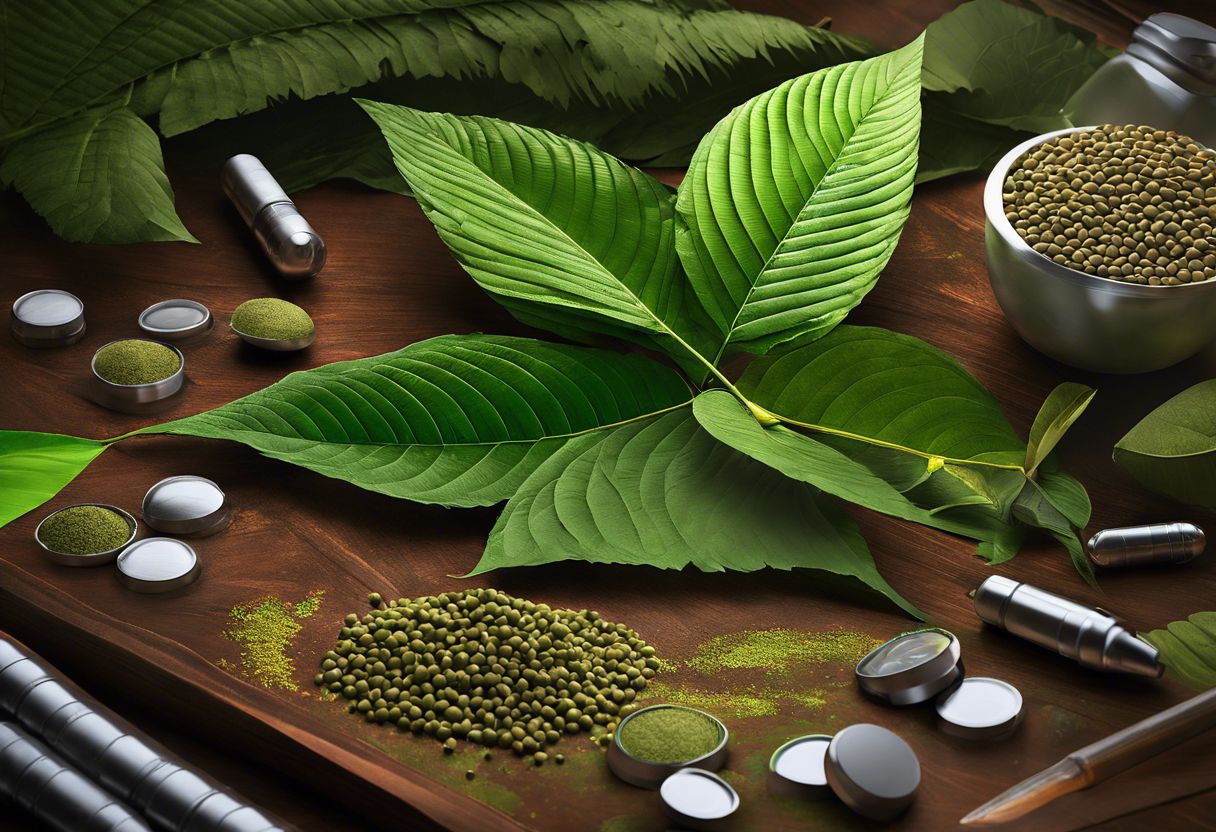You’re online, scrolling through the endless options of Kratom, trying to understand if it’s legal and safe to buy. The debate over its ban is making headlines, but what does it mean for you? With conflicting reports and ever-changing regulations across states and at the federal level, you might feel lost in a sea of information.
Imagine unlocking a clear map that guides you through the complex world of Kratom regulation. That’s where this blog comes in – offering you up-to-date insights on state versus federal stances on Kratom, its health considerations, and why everyone can’t stop talking about it.
Get ready to navigate these murky waters with confidence; we’ve got your back every step of the way. Keep reading; clarity awaits!
Key Takeaways
- Kratom laws are different in each state. Some states have banned it, but in others, it’s legal.
- The FDA is worried about the safety of kratom and wants more research. They say it can cause addiction and other health problems.
- The DEA tried to make kratom a Schedule I drug, which means it would be illegal like heroin. But many people did not agree with this and the DEA changed its mind.
- If you want to use or buy kratom, you need to check what your own state says about it because some places might let you get into trouble for having it.
- People who like using kratom think that if there’s a ban, they won’t be able to get safe kratom anymore. They also say bans could stop scientists from studying if kratom has good uses for health.
Understanding Kratom

Kratom comes from a tree in Southeast Asia and people use its leaves for different reasons. Some chew the leaves, others make them into tea or put them into capsules to feel more alert or to calm down.
Kratom acts like an opioid, which means it can help with pain relief and may ease opioid withdrawal. Yet, unlike opioids, many believe kratom is safer because it doesn’t cause trouble as often when used properly.
Folks argue about kratom’s safety because there isn’t enough research yet. The plant contains substances called mitragynines that link up with some parts of your brain just like morphine does.
This can lead to pain relief but also might make a person want to keep using kratom too much without stopping. Regulations differ a lot between states so you need to know the laws where you live before buying or using kratom.

The Role of the U. S. Food and Drug Administration (FDA) in Kratom Regulation
The FDA plays a key role in regulating Kratom, expressing concern about its potential risks, but also supporting research to understand its effects. The agency’s stance on Kratom has sparked debate and calls for further study into the plant’s medical use and safety.
FDA’s stance on Kratom
FDA sees kratom as a big concern. They think it has risks and no proven health benefits. Also, the FDA says that kratom may have effects like other opioids. Because of this, they are watching it closely and have taken action against it.
They want to stop people from using kratom without knowing its dangers. The FDA has also stopped some imports of kratom into the country. Plus, they support research on kratom to learn more about how it works and its safety.
The potential risks of Kratom according to the FDA
The FDA has concerns about Kratom and its safety. Here are the risks they point out:
- Addiction: The FDA says that Kratom can cause addiction. People may want to keep using it more and more.
- Overdoses: There have been reports of people taking too much Kratom, which can be very dangerous.
- Withdrawal symptoms: When someone stops using Kratom after a long time, they could feel very sick. This is like what happens with other drugs when people try to quit.
- Drug interactions: Kratom might not be safe if you mix it with other medicines or drugs. This can lead to serious health problems.
- Unproven claims: Companies sometimes say that Kratom can treat health problems, but the FDA hasn’t checked if these claims are true.
- Contaminants: Sometimes, Kratom products have other harmful things in them that aren’t supposed to be there.
- Lack of research: The FDA wants more studies on how safe and effective Kratom is before saying it’s okay to use.
- Harmful effects: People have had liver damage, seizures, and even heart issues from using Kratom.
FDA’s efforts to support research on Kratom
While the FDA has expressed concerns about the potential risks of Kratom, it is also actively working to support research on this substance. The FDA recognizes the need for more scientific understanding of Kratom and its effects.
This is crucial for evaluating its safety and potential benefits. Through supporting clinical trials and research studies, the FDA aims to gather comprehensive data on Kratom’s impact on individuals’ health and well-being.
By investing in research efforts, the FDA can gain valuable insights into Kratom’s pharmacology and potential medicinal uses. This focus on evidence-based research will help provide consumers with accurate information about Kratom, allowing them to make informed choices about its usage based on reliable data rather than speculation or misinformation.
The DEA’s Involvement with Kratom
The DEA initially moved to classify Kratom as a Schedule I controlled substance, but faced pushback from advocates and researchers challenging the decision. To learn more about the ongoing debate over Kratom regulation, read on for a comprehensive overview of state and federal involvement in this controversial issue.
DEA’s initial decision regarding Kratom
The DEA initially planned to classify kratom as a Schedule I drug in August 2016. This category includes illegal drugs with high potential for abuse and without accepted medical use or safety for use under medical supervision.
However, the decision was later withdrawn. The status of kratom regulation remains a subject of debate between federal and state authorities, leading to varying approaches and laws across different regions.
Numerous legislatures are deliberating on whether to regulate or ban kratom due to its mild opioid-like properties.
Kratom is not currently regulated at the federal level but can be legally sold in many states. Imported kratom faces FDA regulation and detention without physical examination because it appears as a dietary supplement or contains dietary ingredients.
The challenge to the DEA’s decision
When the DEA announced in 2016 that it would classify kratom as a Schedule I drug, many people and organizations challenged this decision. The decision to temporarily reclassify kratom was met with strong opposition due to its potential impact on access to the substance for medical and research purposes.
This led to a significant pushback from individuals and groups advocating for the continued legality of kratom. Additionally, concerns were raised about the lack of clear evidence justifying such strict regulation based on facts like ongoing debate between federal and state authorities regarding the regulation of kratom.
State Regulation of Kratom
Each state has its own regulations regarding Kratom, with some implementing bans while others have chosen to keep it legal. Understanding the specific laws in your state is crucial before purchasing or using Kratom products.
To find out more about the different regulations across states, continue reading this blog.
Kratom regulation in various states
Kratom regulation varies across different states in the U.S. Here’s what you should know:
- Alabama, Arkansas, Indiana, Tennessee, Vermont, Wisconsin, and the District of Columbia have banned kratom.
- At least three cities have also banned kratom within their limits.
- In other states where it remains legal, there may be specific regulations on its sale and use.
- The status of kratom regulation is frequently under review at both state and federal levels.
- It’s essential to stay informed about the legal status of kratom in your state before purchasing or using it.
The consequences of state-level bans
State-level bans on kratom can have significant implications for consumers. When a state places a ban on kratom, it becomes illegal to possess, sell, or distribute the substance within that state.
This means that if you reside in a state where kratom is banned, you could face legal consequences for using or purchasing it. Additionally, such bans can limit access to kratom for individuals who rely on it for potential health benefits.
It’s important to stay informed about the legal status of kratom in your state and understand the potential repercussions of using or possessing this substance if it is prohibited.
The Public’s Response to the Kratom Ban
As the debate over Kratom’s legality continues, it’s important to consider the potential harm of a Kratom ban and understand both sides of the argument. To learn more about how this issue is impacting consumers shopping for Kratom online, continue reading below.
The potential harm of a Kratom ban
A Kratom ban could lead to limited access for people who rely on it, potentially driving them towards unregulated and unsafe sources. This situation may increase the risk of adulterated or contaminated products entering the market, putting consumers in danger.
Furthermore, a ban might impede scientific research into the substance’s potential benefits and risks, hindering efforts to understand its effects and develop safer usage guidelines.
It’s essential for consumers to have access to regulated and high-quality products to ensure their safety.
The banning of Kratom can also impact individuals who use it as an alternative treatment for pain or opioid addiction, potentially limiting their choices for managing these conditions safely.
The debate over Kratom’s legality
The debate over Kratom’s legality rages on as various states and federal agencies grapple with differing regulations. While some states have banned Kratom, others allow its sale. This conflicting landscape leads to uncertainty for both sellers and consumers, creating a need for clarity and consistency in the laws surrounding this controversial substance.
In August 2016, the DEA announced it would temporarily reclassify kratom as a Schedule I drug due to its potential for abuse. However, amidst public outcry and pressure from advocates, the decision was later withdrawn.
The FDA has also conducted investigations into kratom’s safety concerns, leading to enforcement actions against its sale and distribution. As legislatures across the United States continue to weigh their options regarding how to regulate or ban kratom, the status of its legality remains subject to change at both state and federal levels.
Health Considerations of Kratom Use: Impact on the Liver
Kratom use may impact the liver, and it’s important to be aware of this. Some studies suggest that using kratom could lead to liver damage. However, more research is needed to fully understand the extent of this risk.
It’s crucial to consider your overall health and any potential liver issues before using kratom, as well as consult with a healthcare professional if you have any concerns about its effects on the liver.
Staying informed about the potential impact on your liver is essential for making safe choices when considering kratom.
Remembering potential harm from Kratom should be taken seriously, especially regarding its impact on the liver.
Conclusion
In conclusion, the debate over kratom regulation involves both state and federal authorities. With varying laws across states and differing approaches by federal agencies, the status of kratom regulation remains a topic of ongoing discussion.
Consumers should stay informed about potential changes in policy as they evaluate their options for purchasing kratom products. It’s essential to be aware of the evolving landscape to ensure compliance with current regulations and make informed decisions as a consumer shopping for kratom.
FAQs
1. What is Mitragyna speciosa and why is it being banned?
Mitragyna speciosa, also known as kratom, is a plant some people use for its effects on the body but it might be banned because agencies like the FDA think it could cause harm and abuse.
2. What does the DEA say about kratom?
The DEA suggests that kratom may have the potential to be abused and be harmful, just like other controlled substances such as fentanyl or opiates.
3. Can you explain what the American Kratom Association does?
The American Kratom Association works to keep kratom legal and shows how it can be used safely. They want good rules to stop bad use instead of making it totally illegal.
4. Why do some people want to keep kratom legal?
People who want kratom to stay legal believe in ‘harm reduction,’ which means they see it as a safer option than very dangerous drugs like heroin or fentanyl.
5. Are there rules for selling or using kratom right now?
Yes, there are different rules in different places where selling or having kratom might be against the law, but these rules can change often so you need to check what’s true where you live.
6. Has any research been done on how safe or unsafe kratom is?
Scientists have done studies trying to understand if kraterm helps with pain or causes health problems but more research is still needed to get clear answers about safety.






